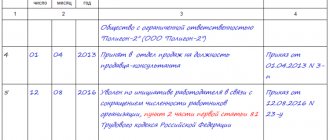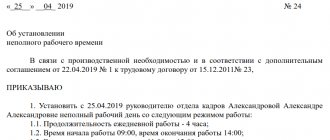PREOBRAZHENSKY DISTRICT COURT OF MOSCOW Plaintiff: N.T.M. address: Moscow, st. Korneichuka, 56, apt. 29 Representative of the Plaintiff: Kuryanov A.A. Legal bureau "Moscow legal" Moscow, st. Maroseyka, 2/15 tel Defendants: LLC "D." registered: 107113, Moscow, Sokolnicheskaya pl., 4A, office 309 address: Moscow, Pevchesky Lane, 4, building 4 LLC "F." registered: 603022, Nizhny Novgorod, Studencheskaya Street, 17A address: Moscow, Pevchesky Lane, 4, building 4 Third party: State Labor Inspectorate in the Nizhny Novgorod Region address: 603005, Nizhny Novgorod, st. Piskunova, 3., copr. 3 amount of claim: RUB 421,554.57.
Specifics of labor relations
Main features:
- conclusion of a contract, preparation of other personnel documents;
- the parties are called “Employee” and “Employer”;
- constant performance of a specific function in accordance with job responsibilities, routines, staffing and the employer’s schedule;
- there is constant monitoring of the citizen’s work by a representative of the administration;
- the employee obeys the employer’s rules, local regulations, has a break, vacation, etc.;
- there is a specific workplace where admission has been issued, a work schedule;
- the employee is trained in safety rules at the enterprise;
- wages are transferred or issued according to a schedule: twice a month.
To establish the fact of labor relations and conclude a contract with the employer, a statement of claim is filed in the manner prescribed by law.
Statement of claim to establish the fact of labor relations
Such an application is subject to consideration exclusively in the district court. At the same time, you can apply at the choice of the employee either at his place of residence or at the address of the employer. It is necessary to note that this requirement is derived from the main one - for example, collection of wages, benefits, and so on.
An additional guarantee for the employee in this case is exemption from all costs. That is, filing a claim is not subject to state duty.
Despite the fact that such a statement is aimed at establishing an employment relationship, part of the evidence confirming the work should be attached to the statement itself. If the employee previously filed a complaint with the labor inspectorate against the employer, the results of this inspection can also serve as separate evidence in the case.
Ways to confirm employment relationships
Like any appeal to the court, a statement of claim to establish the fact of work must be based on evidence, which includes:
- statements from witnesses, such as other employees;
- power of attorney from the employer for representation before government agencies and contractors;
- documents in which the citizen signed on behalf of the employer (invoices, acts);
- pass to the enterprise, territory;
- schedule;
- order to be sent on a business trip, subject to disciplinary liability;
- correspondence with the employer, including email or SMS;
- documents confirming completion of safety training;
- availability of special clothing;
- statement of account for salary transfer.
Example of a claim:
The Supreme Court helped workers establish labor relations
Oleg Bazhov* and Pavel Sobolevich* agreed with Contact LLC about work: they discussed the conditions, schedule and remuneration in the amount of 100,000 rubles. per month. The company issued an order according to which Sobolevich was appointed as a production engineer, and Bazhov as a safety and labor protection engineer. The men were issued work permits and passes. They worked for several months, but did not receive a salary. When the company owed each employee 241,935 rubles, Bazhov and Sobolevich quit. And then it turned out that no one formalized them, no employment contracts were signed with them, no entries were made in the work book.
The workers went to court, where they asked to establish the fact of labor relations between them and Kontakt LLC, to oblige the company to make entries in the work books, and to recover 241,935 rubles in favor of each. salaries, 19,645 rubles. compensation for late payment of this money, 100,000 rubles. compensation for moral damage and 35,000 rubles. for payment of representative services.
CASE No. 8-КГ18-9
PLAINTIFFS: Oleg Bazhov*, Pavel Sobolevich*
RESPONDENT: Contact LLC
ESSENCE OF THE DISPUTE: On establishing the fact of labor relations
DECISION: The appealed court decisions are canceled and the case is sent for a new trial to the court of first instance
The court examined written evidence, including electronic registration information from the checkpoint, according to which Bazhov and Sobolevich entered the territory of the company. In addition, the court heard testimony from two witnesses who worked with the plaintiffs. At the same time, the company also did not formalize labor relations with them, no contracts were signed with them, and no entries were made in the work book.
The Leninsky District Court decided that the workers could not prove the existence of an employment relationship, including the period for which they were hired, the schedule of their activities, agreement with the employer on working conditions, including the amount of salary. According to the district court, there were civil relations between the parties under a contract. Therefore, the court of first instance rejected the claims. The Yaroslavl Regional Court supported him, pointing out that in the case materials there is no information about Bazhov and Sobolevich submitting applications for employment and dismissal, there are no orders about this, there is no data on the conclusion of employment contracts, as well as on the execution of work books. Ex-employees of “Contact” did not agree with the conclusions of lower authorities and appealed them to the Supreme Court.
The decision of the Supreme Court and the opinion of experts: fair protection of workers’ rights
The Supreme Court noted: the conclusion of the lower courts about the existence of civil law relations between the parties under the contract was made without taking into account Chapter. 37 of the Civil Code, especially since no one has seen the contract itself. According to the Supreme Court, the lower courts did not evaluate the evidence presented, did not examine the factual circumstances taking into account the arguments and objections of the parties, and incorrectly determined the burden of proof.
VS: “An employment contract is considered concluded if the employee began to perform his job function and performed it with the knowledge and on behalf of the employer. The existence of an employment relationship between the parties is presumed. The employer must provide evidence of the absence of an employment relationship.”
The judges of the Supreme Court reminded: when the court considers such disputes, irremovable doubts are interpreted in favor of the existence of labor relations (Part 3 of Article 19.1 of the Labor Code). The Supreme Court called on the courts to find out whether there were signs of labor relations and whether there was any abuse on the part of society of the right to conclude a civil contract contrary to the intention of the employees to conclude an employment contract (Articles 15, 22, 56 of the Labor Code). Therefore, the Supreme Court canceled the appealed court decisions and sent the case for a new trial to the court of first instance (No. 8-КГ18-9). It has not yet been reviewed.
The courts of the first and appellate instances did not take into account that the mere absence of a position or other documents in the staffing table does not exclude the possibility of recognizing the relationship as an employment relationship.
Natalya Zalyubovskaya, Associate Professor of the Department of Legal Regulation of Economic Activities of the Financial University under the Government of the Russian Federation, Ph.D. n.
Experts welcomed the Supreme Court's determination. “The Supreme Court quite rightly sided with the workers and pointed out that there is no evidence of a written contract between the parties,” said Yevgeny Korchago, a member of the Council for Interaction with Civil Society Institutions under the Chairman of the Federation Council.
“In such disputes, citizens are always the weaker party that needs protection. But in this case there is no doubt about the labor nature of the relations between the parties,” says partner AB Pleshakov, Ushkalov and partners Pleshakov, Ushkalov and partners Federal Rating. Vyacheslav Ushkalov. “I believe that the ruling will make the practice of lower courts more uniform,” said the Deputy General Director for Legal Affairs of the National Legal Service AMULEX National Legal Service AMULEX Federal Rating. Yulia Galueva.
“It is difficult to disagree with the definition of the Armed Forces, since there are enough signs for recognition of labor relations. The employing company did not properly formalize the employment contract, but allowed employees to work (they had work permits, electronic passes to the site, assignment orders). Why the employees were not properly registered should be investigated by the labor inspectorate. Compensation must be calculated based on the company’s staffing table, and not a verbal agreement,” noted the head of the analytics department of the law firm BMS Law Firm BMS Law Firm Federal Rating. Alexey Perepelkin.
Advisor, head of land and property relations practice Alliance Legal Consulting Group Alliance Legal Consulting Group Federal rating. group PPP/Infrastructure projects group Dispute resolution in courts of general jurisdiction group Criminal law group Bankruptcy (including disputes) Company profile Olga Kalinchenko recalled that the Supreme Court had already helped employees in a similar dispute (No. 8-КГ18-9). “Currently, judicial practice is moving towards strengthening the protection of the rights and legitimate interests of workers (No. 34-КГ17-10). This approach ensures the fullest possible protection of the interests of participants in labor relations,” added senior lawyer at Althaus Legal Althaus Legal Federal Rating. group Tax consulting and disputes (Tax consulting) group Land law/Commercial real estate/Construction group Intellectual property (including disputes) group Corporate law/Mergers and acquisitions Company profile Angelina Vlasova.
* – first and last names have been changed by the editors.
- Alina Mikhailova
- Supreme Court of the Russian Federation
How to file a claim
Compilation procedure:
- indicate the court;
- indicate the plaintiff (last name and initials, residential address, contact telephone number);
- designate the defendant;
- indicate the name of the document;
- describe the situation (permission to work, lack of registration);
- list the evidence;
- outline the requirements: draw up a contract, labor agreement, etc.;
- indicate the requirements for collecting earnings, if any;
- list applications;
- sign and date.
Statute of limitations
The concept of limitation of action for going to court is regulated by Article 392 of the Labor Code of the Russian Federation.
According to it, the period during which an employee can go to court is three months from the moment the employee learned (should have known) about the violation of his rights. If the claim is related to illegal dismissal, then one month.
Missing these deadlines is possible for a reason recognized by the court as valid, and if the employer requests the application of a statute of limitations.
That is, in simple terms, you have three months to recognize the employment relationship between you and the employer as valid. If you missed this point without any good reason, then the likelihood of your claim being denied is very high.
Key points for applying
When there are problems with the recognition of the plaintiff’s completed activities in a specific organization, a statement of claim is prepared aimed at establishing the fact of the existing labor relationship. The following recommendations should be taken into account when preparing it:
- The filing is made directly to the court of district or city subordination at the current legal address of the defendant. If the employee carried out work not in the main office, but in its separate branch, the appeal is submitted at the place of work of the plaintiff;
- What is noteworthy is that the employee himself, who decides to appeal on this issue, is exempt from all possible expenses in the case; they are assigned to the defendant;
- The collection and preparation of evidence at the time of filing a claim lies with the plaintiff; it is advisable to first check the relevance of the submitted documents, which could confirm the very fact of employment in a given place. If it is not possible to collect all the required documents in an informal way, you will need to submit a corresponding application, which is drawn up separately from the claim for recognition of the fact of labor relations, regarding the release of data related to the plaintiff’s activities;
- It is important to contact the labor inspectorate before submitting such an application, which is a very practical solution and this approach is justified. The inspector can check the presence of unregistered persons employed at work (based on data available in the employer’s archives), which will help collect the required evidence base on this issue;
- As practice shows, the main requirements specified in the prepared document are the recovery of wages (withheld from payment as a result of the defendant’s unlawful actions), subsequent reinstatement to the previous job. To successfully represent your interests at a court hearing, it is recommended that you familiarize yourself with other information aimed at quickly resolving labor conflicts.








